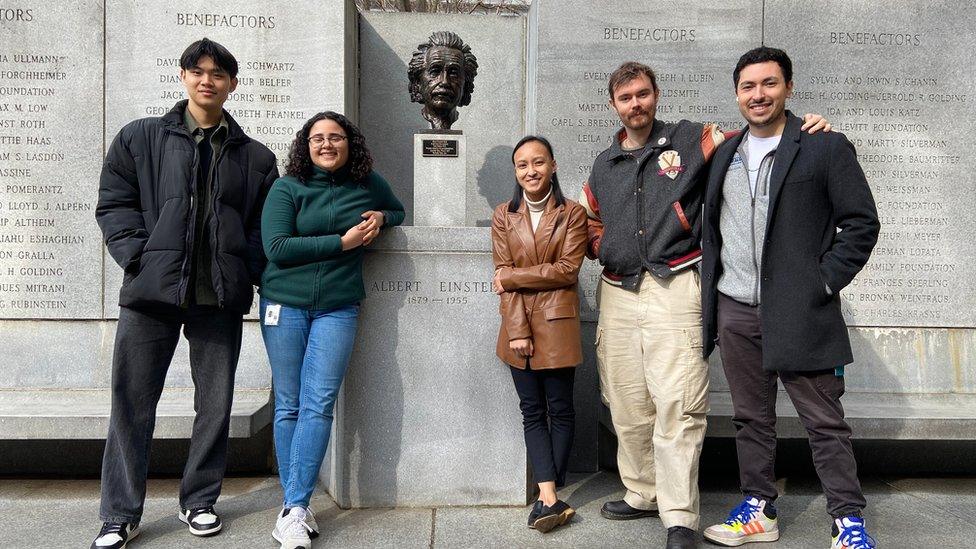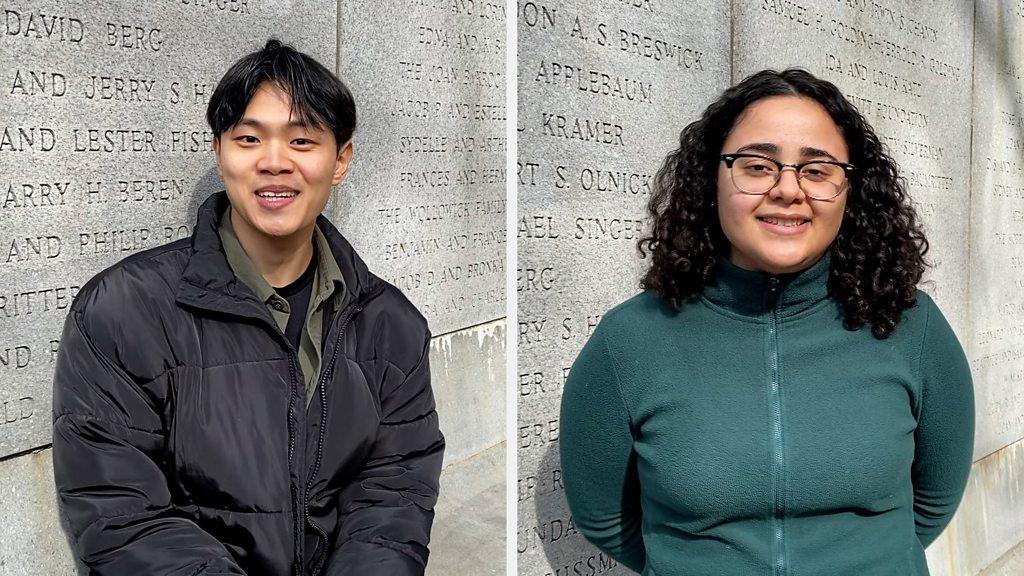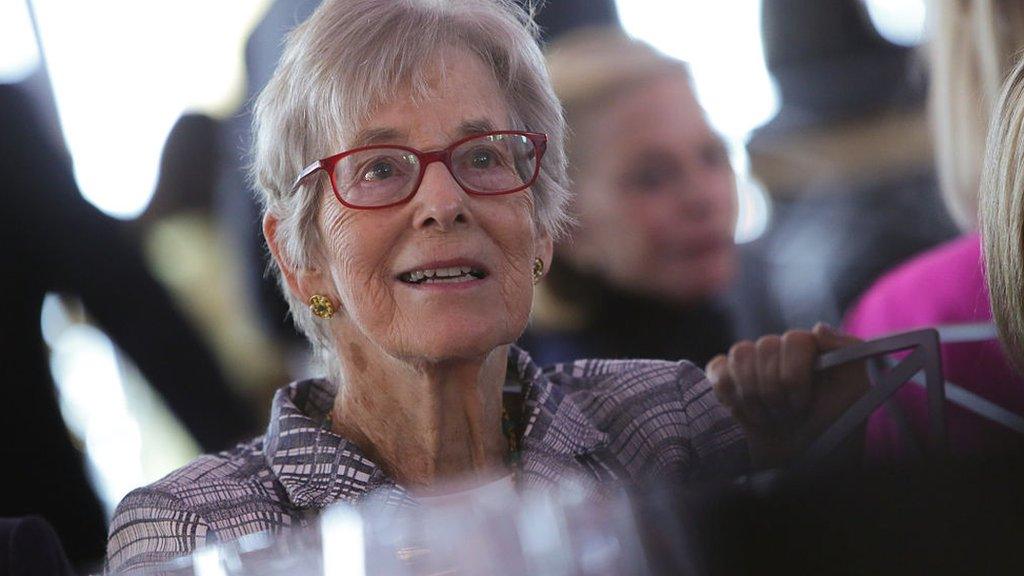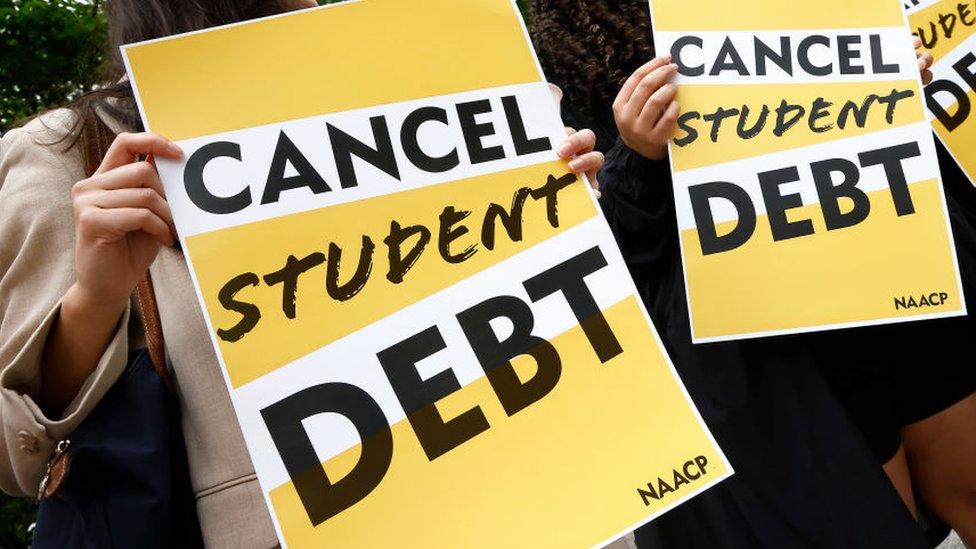Albert Einstein College of Medicine: An unimaginable gift just changed these students' lives
- Published
Watch: 'I don't have to work two jobs' - Medical student after cancelled tuition
Yuliana Dominguez Paez, a 24-year-old student at the Albert Einstein College of Medicine, was going to miss the mysterious assembly that her faculty had scheduled on Monday morning.
Stuck in New York City's interminable traffic, she asked a friend to FaceTime her with any news.
From the other end of the line, "all I heard was screams," she said. "And, 'free tuition.'"
Back on campus, Dr Ruth Gottesman had just changed the lives of Ms Dominguez Paez and her peers.
The college's former professor, philanthropist, and widow of a major Wall Street financier announced to a packed auditorium that she was donating $1bn (£790m), with the intention of eliminating tuition fees for those studying medicine at this school in the Bronx.
The students screamed. They cheered. They called their mums. In the back of an Uber, Ms Paez cried. "When I got back to campus… I just hugged all my friends, because this is life-changing for all of us."
As the US grapples with a student debt crisis and political solutions seem far out of reach, Albert Einstein College of Medicine has suddenly charted a different course.
After being relieved of as much as six figures of debt, students told the BBC they could suddenly envision goals that had felt financially out of reach. They spoke of starting families, buying homes - and embarking on a career guided not by the need to repay a mountain of loans, but by giving back to their communities and bolstering underserved areas of medicine.
Less than 24 hours after Dr Gottesman's announcement, five students sat down with the BBC in the sunshine of a campus courtyard to share their new ideas about the future.
"It felt like an answered prayer," said Sam Woo, a first-year medical student from the Midwest who wants to focus on addiction medicine and providing healthcare to low-income patients.
When he arrived a few months ago, he believed he would have to take on extra jobs and burden himself with loans to pursue a degree and support his family.
"Something that I think about a lot when choosing my career path is money, because it's really important for me. I come from a low-income background and street outreach is not the most lucrative field," Mr Woo, 23, said. "But now I don't have to worry about, 'Okay, I should choose a specialty that pays more, so I can support people back home and so I can support myself.' I can actually do things I'm really passionate about."
The private university charged $59,000 annually for its four-year medical programme, which Ms Dominguez Paez - a member of student group First Generation/Low Income Partnership - said was too pricey for many.
American medical schools are typically very expensive, and many doctors begin their careers with six-figure debts. In 2023, medical students in the US on average graduated with $250,995 in student loan debt, according to an analysis by the Education Data Initiative. That sum can take decades to pay off.
Dr Peter Campbell, a professor of epidemiology and biostatistics at the college, said eliminating the financial burden meant his students were able to choose their paths in medicine without worrying about what it might pay.
He described Monday as "unquestionably the happiest day" he had experienced in 20 years of teaching, including three at Einstein.
"We saw all our students coming in, they were absolutely electric," he said. "I've never seen 20-something year-olds collectively that happy in my life. There was just so much pure happiness."

L-R: Sam Woo, Yuliana Dominguez Paez, Jade Andrade, Trevor Barker and Nelson Perez Catalan, who spoke to the BBC after the college's announcement
The students will still have to pay for costs like housing, food, test preparation, and registering for exams - costs that can run into the tens of thousands of dollars. But there is no question that the new policy could prove to be transformative for the approximately 1,000 current students.
Students already in their fourth year of medical school would have their spring semester reimbursed, according to Elaine Iandoli, a spokeswoman. She said that tuition would be funded in perpetuity from interest on the $1bn donation.
Trevor Barker, a 25-year-old from California, said his classmates were talking about getting married or having children sooner than they had previously thought, thanks to their freedom from loans.
At the same time, the students said, the school now had a responsibility to diversify its admissions, and provide a pathway to a medical career for applicants from the surrounding community. The Bronx is the poorest borough in New York City and is ranked among the least healthy counties in the state.
According to the school's statistics, nearly half of its MD students are white. Eleven percent are Hispanic or Latino, and only 5% are black. The demographics are fairly similar for its PhD program. Meanwhile, 44% of Bronx County residents are black, and 56% of its residents identify as Hispanic or Latino, according to 2020 census data.
"I feel like what I'm most excited to see is seeing an increase in applications that reflect the population in the Bronx," said Ms Dominguez Paez. "Because now they know that they have the opportunity to afford going to medical school."
Nelson Perez Catalan, a 28-year old student pursuing a joint MD and PhD, had witnessed a "huge bias in medicine for high scores, and people who have very traditional ways of showing success through their application, and that is also tied to income levels."
He said: "This is an opportunity for reinventing the wheel and rethinking what admissions looks like, how we assess who gets to become a doctor."
Jade Andrade, 30, who aspires to work in paediatric medicine, was thrilled for herself and her classmates.
"But I think most exciting thing is really the impact this will have on future generations of students," she said. "The larger picture is, this is really a beacon of hope."
Watch: Moment medical students find out school will be tuition-free after $1bn donation
Related topics
- Published28 February 2024

- Published26 February 2024

- Published21 February 2024
